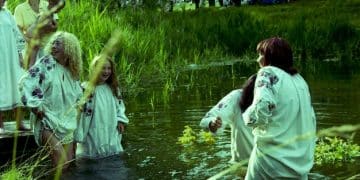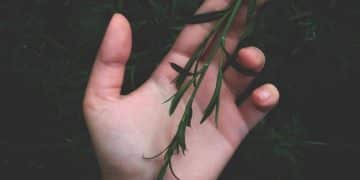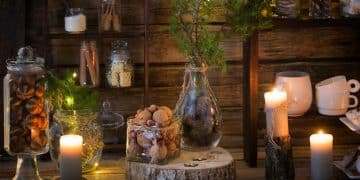Herbalism for Witches: Grow & Use Medicinal Herbs in Your Practice
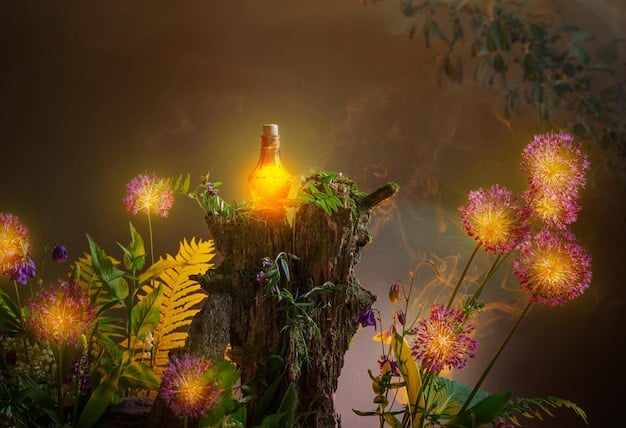
Herbalism for witches involves cultivating and utilizing medicinal herbs to enhance their craft, connecting with nature’s energy, and creating potent remedies for spiritual and physical well-being.
Embark on a journey into the verdant world of herbalism for witches, where the power of plants intertwines with ancient wisdom and magical practice. Discover how cultivating and using medicinal herbs can deepen your connection to nature and enrich your craft.
The Witch’s Garden: An Introduction to Herbalism
Herbalism has long been intertwined with witchcraft, offering a tangible connection to the earth and a potent source of magical ingredients. A witch’s garden is more than just a collection of plants; it’s a sacred space where energy is cultivated, and intentions are nurtured.
Understanding the basics of herbalism can empower you to create your own spells, potions, and remedies, enhancing your practice with the natural world’s inherent magic.
Why Herbs are Important in Witchcraft
Herbs are an integral part of witchcraft for their symbolic meanings, energetic properties, and medicinal uses. Each herb carries unique vibrations, connecting witches to the earth’s energy.
- Symbolism: Many herbs are associated with specific deities, planets, and elements, making them valuable in rituals and spells.
- Energetic Properties: Herbs can amplify intentions, protect against negative energies, and attract positive influences.
- Medicinal Uses: The healing properties of herbs can be harnessed for both physical and spiritual well-being, creating holistic remedies.
By incorporating herbs into your practice, you’re aligning yourself with the natural world’s rhythms and tapping into ancient traditions of healing and magic.
Cultivating Your Own Witch’s Garden
Starting your own witch’s garden is a rewarding endeavor that allows you to connect more deeply with the plants you use in your practice. Whether you have a sprawling backyard or a small balcony, you can create a space that nurtures both your herbs and your spirit.
Choosing the right location, preparing the soil, and selecting the appropriate herbs are crucial steps in creating a thriving witch’s garden.
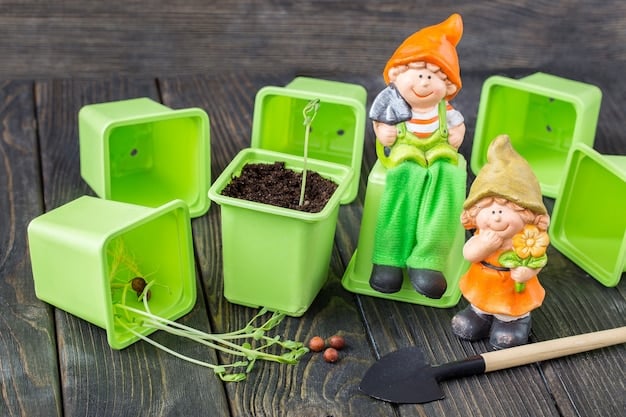
Choosing the Right Location
The location of your garden plays a significant role in the health and vitality of your herbs. Consider factors such as sunlight, water access, and protection from harsh weather.
Most medicinal herbs require at least six hours of sunlight per day. Ensure your garden receives ample sunlight, especially during the growing season. Proximity to a water source can simplify watering, and sheltered spots can protect delicate herbs from strong winds or frost.
Preparing the soil is another vital step. Amend your soil with compost and organic matter to improve drainage and fertility. A well-draining soil is crucial to prevent root rot and ensure your herbs thrive.
Essential Herbs for the Witch’s Apothecary
Certain herbs are considered staples in a witch’s apothecary due to their versatile magical and medicinal properties. These herbs can be used in a variety of spells, rituals, and remedies, making them invaluable additions to your practice.
From protection and purification to love and healing, these essential herbs can support a wide range of intentions and purposes.
Popular Herbs and Their Uses
- Rosemary: Known for its cleansing and protective properties, rosemary can be used in rituals, spells, and herbal remedies.
- Lavender: Valued for its calming and soothing effects, lavender is often used in sleep spells, meditation, and stress relief.
- Chamomile: Renowned for its gentle healing properties, chamomile can be used in teas to promote relaxation and ease anxiety.
- Sage: Revered for its ability to purify and cleanse spaces, sage is commonly used in smudging rituals and banishing spells.
These herbs can be incorporated into various magical practices, from creating protective amulets to brewing soothing teas.
Magical Uses of Herbs in Witchcraft
The magical uses of herbs in witchcraft are vast and varied, spanning from spellwork to potion-making. Each herb carries inherent energy that can be harnessed to manifest intentions and create desired outcomes.
Understanding how to use herbs in different types of magic can empower you to enhance your spells and rituals.
Herbal Spells and Rituals
Herbs can be incorporated into spells and rituals to amplify their effectiveness. Create sigils, craft talismans, or brew potions with intention and focused energy.
Use herbs in candle magic by dressing candles with essential oils or dried herbs. Incorporate them into incense blends for purifying or invoking specific energies. Brew herbal teas or infusions to drink during rituals, internalizing the herbs’ potent essences.
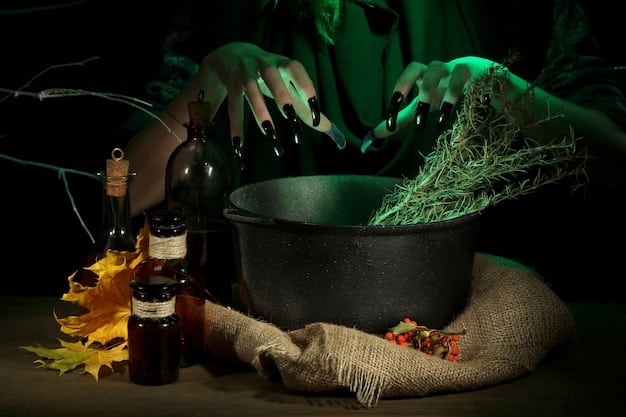
By understanding and utilizing the unique properties of each herb, you can create powerful and personalized spells and rituals that align with your intentions.
Creating Herbal Remedies for Health and Wellness
Herbal remedies have been used for centuries to support health and wellness. By understanding the medicinal properties of herbs, you can create your own natural remedies for common ailments and promote overall well-being.
From teas and tinctures to balms and salves, there are many ways to harness the healing power of herbs.
Herbal Teas and Infusions
Herbal teas and infusions are a gentle and effective way to enjoy the medicinal benefits of herbs. Simply steep dried herbs in hot water to extract their potent compounds.
Create a soothing chamomile tea to calm the nerves and promote restful sleep. Brew a ginger tea to alleviate nausea and aid digestion. Make an elderflower infusion to support the immune system during cold and flu season.
Experiment with different combinations of herbs to create custom teas that address your specific health needs and preferences.
Ethical and Sustainable Herbalism Practices
Practicing herbalism requires responsibility and respect for the environment. Adopting ethical and sustainable practices ensures that future generations can continue to benefit from the healing power of plants.
Consider sourcing herbs sustainably, growing your own when possible, and minimizing your environmental impact.
Sourcing Herbs Responsibly
- Grow Your Own: Cultivating your own witch’s garden ensures that your herbs are grown sustainably and ethically.
- Support Local Growers: Purchase herbs from local farmers and herbalists who prioritize sustainable practices.
- Wildcrafting with Care: If you choose to wildcraft herbs, harvest responsibly and avoid over-collecting from any one area.
Always ask questions about the sourcing and harvesting practices of the herbs you purchase to make informed choices.
By embracing sustainable practices, you can honor the earth and ensure that future generations can continue to benefit from the magic and medicine of herbs. Engaging in herbalism for witches is not just about using herbs; it’s about building a relationship with the natural world. Consider how to tread lightly on the earth, ensuring that your practice is harmonious with the environment.
| Key Point | Brief Description |
|---|---|
| 🌱 Starting a Witch’s Garden | Begin by selecting a sunny location with well-draining soil. |
| 🌿 Essential Herbs | Include Rosemary, Lavender, Chamomile, and Sage for various magical uses. |
| ✨ Magical Practices | Use herbs in spells, rituals, and potion-making to amplify intentions. |
| 🌱 Ethical Herbalism | Source herbs responsibly, grow your own, and respect the environment. |
FAQ
▼
Herbalism for witches is the practice of using herbs for magical and medicinal purposes. Witches cultivate and utilize herbs to enhance spells, create potions, and promote well-being, with a deep connection to nature and its energies.
▼
Essential herbs for a witch’s garden include rosemary, lavender, chamomile, and sage. These herbs offer a range of magical and medicinal properties, from protection and cleansing to calming and healing.
▼
Herbs can be used in various witchcraft practices such as spellwork, rituals, and potion-making. They can be incorporated into candle magic, incense blends, herbal teas, and amulets to amplify intentions and enhance magical outcomes.
▼
Ethical considerations in herbalism include sourcing herbs responsibly, growing your own plants, supporting local growers, and practicing wildcrafting with care. Sustainability and respect for the environment are crucial aspects of ethical herbalism.
▼
Herbal remedies can promote health and wellness through various methods, such as herbal teas, infusions, tinctures, and balms. These remedies harness the medicinal properties of herbs to address common ailments and support overall well-being.
Conclusion
Embracing herbalism for witches is a journey into the heart of nature’s magic, where the cultivation and utilization of herbs offer profound connections to the earth and enhanced spiritual practices. By understanding and respecting the inherent power of plants, you can enrich your craft, create potent remedies, and foster a harmonious relationship with the natural world.
